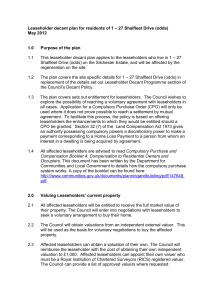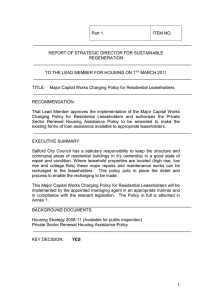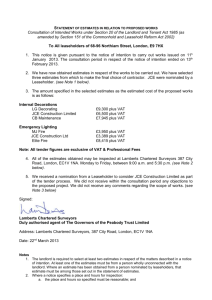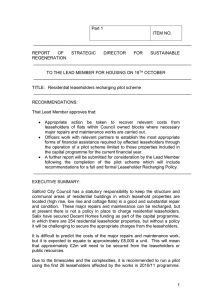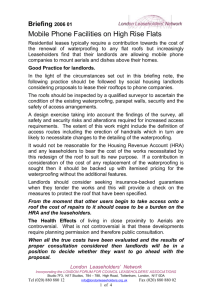Major Capital Works Charging Policy for Residential Leaseholders
advertisement
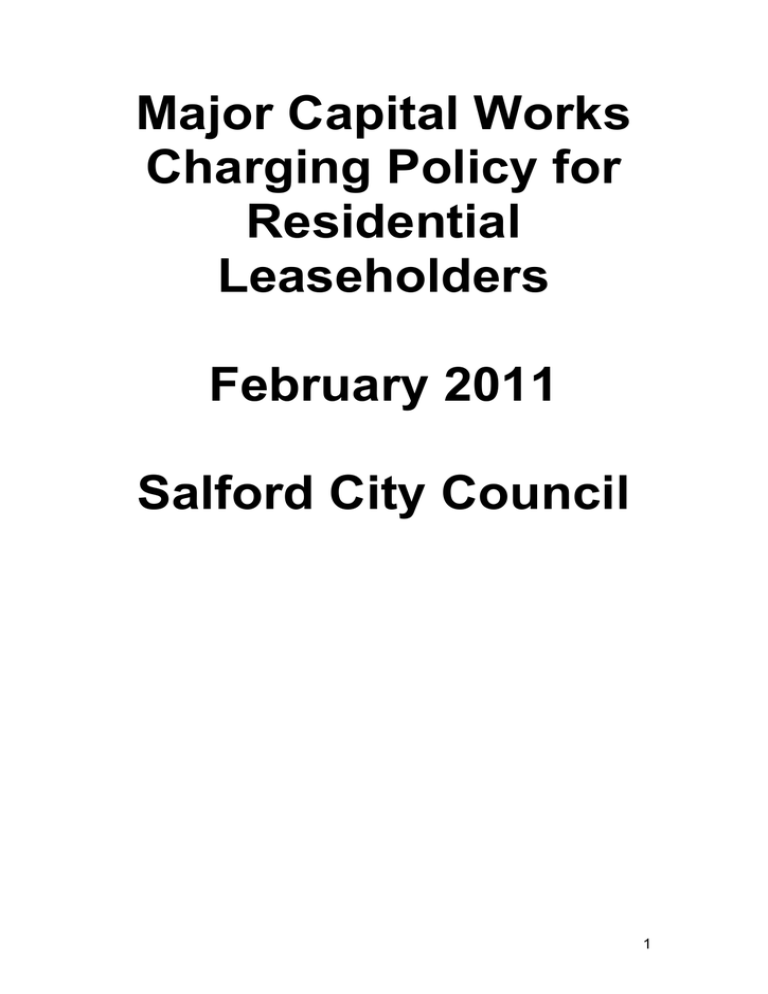
Major Capital Works Charging Policy for Residential Leaseholders February 2011 Salford City Council 1 Introduction: Salford City Council has a statutory responsibility to keep the structure and communal areas of residential buildings in it’s ownership in a good and substantial repair and condition. The Landlord and Tenant Act 1985, allows the landlord of the property to recharge the leaseholder for their share of any major capital works that are carried out as part of this duty. Although the legislation allows for this, what can be charged for is determined by the detailed contents of the lease. Leaseholders pay an annual service charge to cover the costs of day to day repairs. This policy sets out the circumstances where a charge will apply and the basis for payment. This policy sets out: what is being charged for; recharging approach and different payment options open to leaseholders; assistance for those who are unable to access resources to meet the costs on their own; consultation processes; and identifies appeals and challenge routes for leaseholders. This will be implemented by the appointed managing agent in an appropriate manner and in compliance with the relevant legislation and Private Sector Renewal Assistance Policy. Supplementary documents to support this are attached in the annex of the policy. Principles: In developing and delivering this policy Salford City Council (landlord) and its managing agent(s) will act to ensure that: We deliver our duties in a cost effective, efficient and economic manner; Apply a fair process for calculating and charging leaseholders for costs in accordance with the lease arising from major maintenance and repairs works; Apply a fair process for recovering charges so those who are able to pay do so, whilst those who require support and assistance gain access to this; and Consult with and provide information to leaseholders in a transparent manner that complies with legislation to ensure that they are fully aware of major maintenance and repair works and how to engage with the process. What can be Recharged for: This policy covers major capital works which are substantial and significant works that will ensure that the Development is in a good and substantial repair and condition. It does not cover day to day maintenance and costs. The Landlord and Tenant Act 1985 provides the basis for what can be charged for, but what each leaseholder has agreed to be charged for will be determined by the detailed content of their lease. The rechargeable major capital works will primarily not relate to the interior of the leaseholder’s property. Rechargeable work will relate to the structure that accommodates the leaseholder property and the grounds – this is known as the Development. Items which serve the Development such as utilities and telecommunications are also included as rechargeable. 2 In discharging its duty through major capital works the Council will consider modern preventative and environmentally friendly, health (removal of previously accepted building material such as Asbestos) and design standards. Although the original Developments were built to the standards of the day, the major capital works need to be compliant with the modern day equivalent standards. The list below shows an example of the likely rechargeable works, but more detail will be provided by each lease: Communally used areas of the Development including: - forecourts and courtyards; fences; and halls and staircases, lifts (if any), landings, steps, passages. The main structure of the Development including: - - foundations, (including replacement damp proof courses); exterior walls, (including cladding); dividing walls and structures between properties, common halls, staircases, landings, steps and passages and all electrical and other fittings and windows in the Development; all doors in the Development (apart from doors that give access to individual properties); and all roofs, their support and chimneys and every part of the Development above the level of the top-floor ceilings. Utilities: - anything that supports the supply of water, heating, power, waste water and drainage e.g. cisterns tanks sewers drains gutters pipes wires cables ducts and conduits in the Development (apart from those that are in the leaseholder property). Telecommunication: - any wireless and television masts and aerials cables and wires erected on the Development or in or over the roof or roofs and available for use with the properties. Charging for Major Capital Works: The managing agent will calculate the costs which an individual leaseholder is required to pay for major works by totalling the actual costs of the work to the building and dividing this by the number of properties in the building. These costs include materials, labour, fees and administration of the major capital works programme. If leaseholders wish to secure and pay for additional works inside their home (which is the leaseholders responsibility to repair and maintain) they are entitled to discuss this with their managing agent. Please see “Decent Homes and Other Internal Improvement Work” section below. Leaseholders will not be charged more than 10% above the final estimate for the works given to them in advance of the work starting. If, once completed, the cost of 3 the works is less than the estimate, then leaseholders will only be charged their share of the actual costs. Consultation and Engagement: Leaseholders will be advised and consulted prior to commencement of the planned major capital works for their Development. The exact detail of the consultation and engagement process will vary depending upon the major works procurement process. These procurement processes are governed by separate government legislation and policy. However, Salford City Council is committed to ensure that all the legal requirements are fulfilled and that leaseholders have sufficient information to engage with the process and make informed decisions and choices. Leaseholders cannot refuse permission for the works to go ahead, because Salford City Council has responsibility to repair and maintain the building under the terms of the lease agreement. Leaseholders do have the right to challenge the charges and the reasonableness of the work via the Leasehold Valuation Tribunal (LVT). Paying for Major Capital Works: Leaseholders will have up to 21 days after completion and billing of the works to pay. There are a number of options open to leaseholders including: using their existing savings, seeking private loans arrangements or any other subsequent arrangements that might be established (like a contributory sinking fund). There are also public financial support options including statutory and discretionary loans, discretionary cap for eligible leaseholders and other support under the Private Sector Renewal Assistance Policy. To support leaseholders to identify the most appropriate option they are advised to seek advice from an Independent Financial Advisor (IFA). Alternatively at the time of writing Salford City Council has an agreement with Salford Money Line (SML), to provide financial advice on City Council approved financial products. Decent Homes and Other Internal Improvement Work: Leaseholders have the opportunity to opt into improvement works, such as the Decent Homes Programme. This work targeted at affordable housing relates to internal improvement works such as replacing kitchens or bathrooms. Please note that this is additional non mandatory maintenance / repairs work. The costs of this work must be repaid over a period agreed with the managing agent. If the leaseholder wishes to explore this improvement option, then the main route is to finance this privately. Challenges, Appeals and Complaints: Early and continuous engagement between the leaseholder and managing agent throughout the whole major capital works process should ensure a quality service and delivery of the major capital works. As indicated earlier, engagement will be determined by the procurement process, but it is expected to include, but not exclusively: appropriate and time considerate consultation with the leaseholders individually prior to the works carried out; wider consultation carried out with all residents in the block or estate before the works start; and 4 contact details provided to allow leaseholders to channel any issues arising whilst the works are being carried out. However, in the unlikely event that a leaseholder feels that the situation has not been raised and resolved in an appropriate manner there are existing challenges, appeals and complaints processes. For appeals, complaints and challenges about the major capital works a leaseholder can: make a formal complaint to the managing agent who will investigate in line with their policy on customer feedback; and / or apply to the appropriate leaseholder body Leasehold Valuation Tribunal for a determination on issues relating to the reasonableness of the works and / or costs. If the leaseholder chooses to apply to the Leasehold Valuation Tribunal, in most cases they will have to pay an administration fee, but this is assessed on a case by case basis. The decision of the Leasehold Valuation Tribunal must be followed by the managing agent and the leaseholder but if either of them are unhappy with the decision then they can appeal to the Lands Tribunal. Challenges, appeals and complaints about the managing agent should be directed to: Sustainable Regeneration Complaints Officer Business Management Team Phase II Civic Centre Chorley Road Swinton M27 5BY Tel: 0161 922 8763 Fax:0161 793 2477 E-mail: complaints.housing@salford.gov.uk The council does not accept challenges about policies that it has developed and that have been approved through the appropriate process. 5
